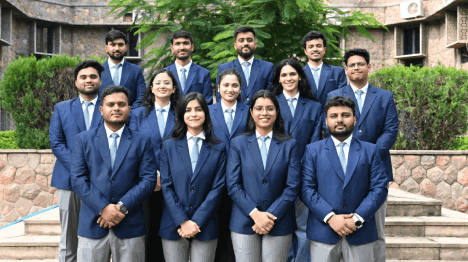- About Us
-
Academics
Schools
Programs
General Information
-
Faculty
The faculty members and researchers working at IIHMR University come from varied backgrounds including, but not limited to medicine, public health, management, economics, statistics, demography, human geography, social and behavioral sciences, rural development and pharmaceuticals.
-
Admissions
- Research
Publications & Journal
- Executive Education
Executive Programmes
- Online Certification Courses
ONLINE CERTIFICATION Courses
- Training
- Placements
- Contact
- Pradanya
- Blog
- Fee Payment
- NAAC
- IQAC
- NIRF
-
About Us
- About IIHMR University
- Board of Management
- Academic Council
- Board of Studies
- Research Board
- Institutional Review Board
- Finance & Audit Committee
- Departmental Research Committee
- Chairperson's Message
- President's Message
- IIHMR University Act
- Infrastructure
- Collaboration
- Ranking
- Board of Studies (School of Digital Health)
- Awards & Accolades
-
Academics
- Institute of Health Management Research
- School of Pharmaceutical Management
- ML Mehta School of Development Studies
- School of Digital Health
- SD Gupta School of Public Health
- MBA (Hospital and Health Management)
- MBA (Pharmaceutical Management)
- MBA (Development Management)
- MBA (Healthcare Analytics)
- Master of Public Health
- Student Manual – Cohort 9 (2021-2023)
- Master of Public Health (Offered by Johns Hopkins Bloomberg School of Public Health, USA in cooperation with IIHMR University, Jaipur, India)
- Ph. D.
- MBA CSR & ESG Management (Executive)
- MBA Sustainable Business Management (Executive)
- Common Information for all the Programs
- Academic Calendar
- Student Handbook 2020-21
- Committees
- Policies
- Annual Exam Calendar
- Library
- Faculty
- Officers of University
- Dean of Institute of Health Management Research
- Dean of School of Pharmaceutical Management
- Dean of School of Development Studies
- Dean of SD Gupta School of Public Health
- Dean of School of Digital Health
- School of Digital Health
- Faculty List A to Z
- Faculty List Designation Wise
- Faculty List School Wise
- Admissions
- Research
- Executive Education
- Training
- Placements
- Alumni
- Events
- Job Openings
- Contact
- Research
Intellectual Property Rights (IPR) Cell

Intellectual Property Rights (IPR) Cell - IIHMR University
Intellectual property (IP) refers to distinct types of creations of the mind. IP shall include Patents, Trademarks, Copyrights, Trade Secrets, and other species such as computer software or printed material, any new and useful process, the machine, composition of matter, life form, article of manufacture, software, copyrighted work, such things as new or improved devices, circuits, chemical compounds, drugs, genetically engineered biological organisms, data sets, software, musical processes, or unique and innovative uses of existing inventions.
Objectives
An Intellectual Property Right Cell (IPR Cell) has been created in IIHMR University under the Chairmanship of Hon'ble President, IIHMR University to look after the activities related to the Intellectual Property (IP) of the University like evaluation and filling of patent, copyright, and design.
IPR Cell of IIHMR University provides a platform for all the researchers, students, staff, startups, and individuals to interact and discuss various breakthroughs, bottlenecks, and recent developments in research with particular relevance to creating, managing, filing, obtaining, and monetization of the IP assets in the university. The IPR Cell will work for the management of IP through University’s IP Policy. Particular attention will be paid by the IPR Cell to conduct awareness sessions about IPR, guide the stakeholders in the generation and preservation of IP in the university. The IPC shall make recommendations to the President, IIHMR University.
Functions of IPR Cell
- To create an awareness about IPR and guide the stakeholders.
- To encourage and support faculty members, research scholars, university staff, and students to involve in patentable IP generation.
- To impart training on future endeavors regarding IP filing processes. Provide support to inventors in novelty check on the IP, facilitate the discussion with IP attorney and enable the filing of IP.
- To work on enabling and supporting technology/IP transfer and commercialization.
- To enable IP Policy adoption and implementation at the university.



